Without Limits: A Shared Vision for the Future of Career Technical Education (CTE Without Limits) was released in March 2020 with the support of over 40 national organizations. In October 2021, Advance CTE launched a technical assistance opportunity called Advancing CTE Without Limits, which sought to support states in a project to coordinate systems, improve equity goals, strengthen policy, or otherwise align with a CTE Without Limits principle. The year-long Advancing CTE Without Limits project ran from March 2022 to March 2023. This blog series shares the details, outcomes and lessons learned from projects across the three Pushing the Limits state teams – Colorado, Nebraska, and South Carolina.
Project Description
 Nebraska has long been a state built around collaboration for Career Technical Education (CTE), particularly in ensuring systems are working toward a common goal and limiting duplication. When reviewing the opportunity to apply for technical assistance for implementation of a CTE Without Limits principle, state leaders looked to specific special populations to help better understand where gaps existed or where collective conversation could lead to better alignment of initiatives. For this reason, Nebraska leaders focused on CTE Without Limits Principle 3: Each learner skillfully navigates their own career journey. Immediately, learners with disabilities jumped out as a population already benefiting from high-quality CTE that, with an interconnected system, could be better served by a combined focus on aligned resources, tools, trainings and supports to make their own career decisions.
Nebraska has long been a state built around collaboration for Career Technical Education (CTE), particularly in ensuring systems are working toward a common goal and limiting duplication. When reviewing the opportunity to apply for technical assistance for implementation of a CTE Without Limits principle, state leaders looked to specific special populations to help better understand where gaps existed or where collective conversation could lead to better alignment of initiatives. For this reason, Nebraska leaders focused on CTE Without Limits Principle 3: Each learner skillfully navigates their own career journey. Immediately, learners with disabilities jumped out as a population already benefiting from high-quality CTE that, with an interconnected system, could be better served by a combined focus on aligned resources, tools, trainings and supports to make their own career decisions.
Nebraska built a highly collaborative team, composed of staff from the Nebraska Department of Education’s Departments of Career, Technical & Adult Education and Special Education, Nebraska Vocational Rehabilitation and local Educational Service Units, to ensure all state level groups impacting learners with disabilities in CTE were present at the table. Nebraska State CTE Director Dr. Katie Graham echoed the value of this collaboration and importance of this project: “CTE Without Limits has helped Nebraska create a north-star relative to supporting all students in high-quality CTE programs! We’ve strengthened partnerships already in place and, leveraging the Vision, moved from sharing updates to active collaboration to ensure every student has access to CTE Without Limits!”
With the support of Advance CTE coaches, Nebraska’s team focused on five key objectives:
- Develop a state-level, sustainable collaborative network that supports students with disabilities in career and technical education and future educational transitions.
- Identify related and overlapping state and local policies, practices and resources to create cohesive structures and supports.
- Identify extant and needed data elements (including student, program, district and financial) and process to strengthen State Education Agency and Local Education Agency data-based decision making for students with disabilities participating in CTE.
- Develop and implement a communication strategy through messaging and building local capacity via professional learning.
- Develop policy and funding recommendations and aligned strategies to address gaps in access and outcomes for students with disabilities in CTE.
Project Outcomes
Developing a coordinated goal: After an initial kickoff workshop, the Nebraska project team started in earnest, standing up multiple workgroups, including a data team, a policy team, and a communications team. All members of the team co-constructed a theory of action to serve as a “north star” for all project work moving forward: “All students deserve a high-quality education that prepares them for future success. To realize this vision, students with disabilities must have equitable access to the full rigor of grade-level instruction, access and enrollment in career technical education programs, and opportunity to receive pre-employment transition services in preparation for earning, learning and living.”
Determining the current state of assets: Throughout the year-long project, the Nebraska team identified an inventory of policies, initiatives, resources and tools used by all three departments to determine where awareness could be raised internally and externally about existing practice. This also helped inform where new and improved practices could be elevated to close gaps. The team examined data policy to better understand what data elements were collected across programs and to determine the feasibility of creating new CTE reports with data disaggregated by disability type or connected to Vocational Rehabilitation data to determine delivery areas most in need of attention. Because of the work of this project, these never-before-produced reports will help inform opportunity gaps and how to better support learners across the age and disability spectrums each year.
Promoting progress: The project team also focused heavily on communications efforts to ensure practice was communicated effectively statewide to both educators and families alike. Leveraging their policy and practice inventory, the team determined training and supports needed for inclusive practices and developed a repository of already existing resources that could be put in use immediately. The team is also updating promotional videos to better communicate the value of CTE to learners and families living with disability.
Training for success: Finally, the project team developed a professional development plan to help support professional learning to include key functions of this project. Supporting learners with disabilities became a focus of Nebraska’s annual CTE conference, with keynotes and breakouts revolving around ensuring all students, including and especially those with disabilities, can skillfully navigate their own career journey. The team also created consistent messaging for including CTE conversations into Individualized Educational Plan (IEP) meetings and determined various funding opportunities or incentives for continuing to support learners with disabilities in CTE programs.
Lessons Learned
After a year, the Nebraska Pushing the Limits team has both made abundant progress and learned valuable lessons that will impact the sustainability of this project long term. First, progress happened naturally; because leaders knew this project was happening, additional alignment opportunities naturally came to light, and group members were invited to other conversations in other agencies. Second, the formal collaboration helped groups take ownership of project components not normally under their purview, resulting in direct action and awareness that would have been much more difficult otherwise.
Stay posted for future updates about Nebraska’s collaborative project or for more information about other states’ Pushing the Limits projects. For more information about CTE Without Limits, visit https://cte.careertech.org/sites/default/files/CTEWithoutLimits_Vision_2021.pdf
To learn more about planning and implementing the principles of CTE Without Limits in your state, check out Pushing the Limits: A Roadmap for Advancing CTE Without Limits.
For additional information on improving access and outcomes for learners with disabilities, we suggest the following resources:
Advancing Employment for Secondary Learners with Disabilities through CTE Policy and Practice
Dan Hinderliter, Senior Policy Associate


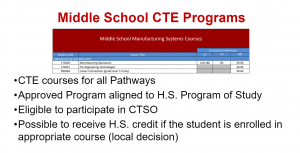 Career advising and development supports geared towards middle grades learners to improve access and achieve high-quality and equitable secondary CTE programs prove to be an early opportunity to develop an occupational identity and better build social capital. Ohio discussed the policy structures the state has put into place to support learners in CTE programs before they enter high school, including funding mechanisms and alignment of middle grades programs of study. Michigan Advance CTE-ECMC Fellow
Career advising and development supports geared towards middle grades learners to improve access and achieve high-quality and equitable secondary CTE programs prove to be an early opportunity to develop an occupational identity and better build social capital. Ohio discussed the policy structures the state has put into place to support learners in CTE programs before they enter high school, including funding mechanisms and alignment of middle grades programs of study. Michigan Advance CTE-ECMC Fellow 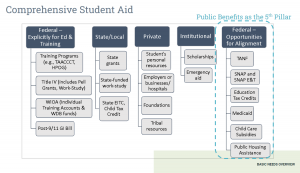 An education consultant and a state leader from Wisconsin provided an overview of programs that support learners basic needs, while elevating that many programs still create barriers for learners to complete credentials. Immediate next steps that were shared included making integrated benefits applications for federal assistance programs available online and inviting benefits coordinators to provide services on campus. Wisconsin highlighted their steps to create affinity groups with faculty and staff, with Dr. Colleen McCabe stating “To understand the effects of poverty, you have to explore learners’ multiple identities.”
An education consultant and a state leader from Wisconsin provided an overview of programs that support learners basic needs, while elevating that many programs still create barriers for learners to complete credentials. Immediate next steps that were shared included making integrated benefits applications for federal assistance programs available online and inviting benefits coordinators to provide services on campus. Wisconsin highlighted their steps to create affinity groups with faculty and staff, with Dr. Colleen McCabe stating “To understand the effects of poverty, you have to explore learners’ multiple identities.” Lawmakers Return to Capitol Hill
Lawmakers Return to Capitol Hill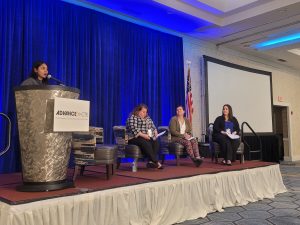 On Friday, May 13, attendees at Advance CTE’s Spring State Leadership Retreat heard from three State CTE Directors participating in Advance CTE’s state cohort to begin implementation of
On Friday, May 13, attendees at Advance CTE’s Spring State Leadership Retreat heard from three State CTE Directors participating in Advance CTE’s state cohort to begin implementation of 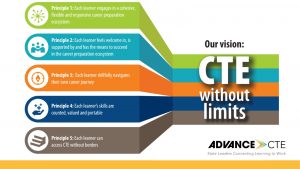 Nebraska’s focus is advancin
Nebraska’s focus is advancin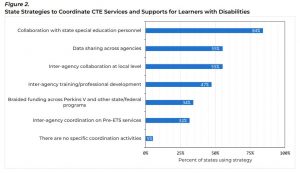
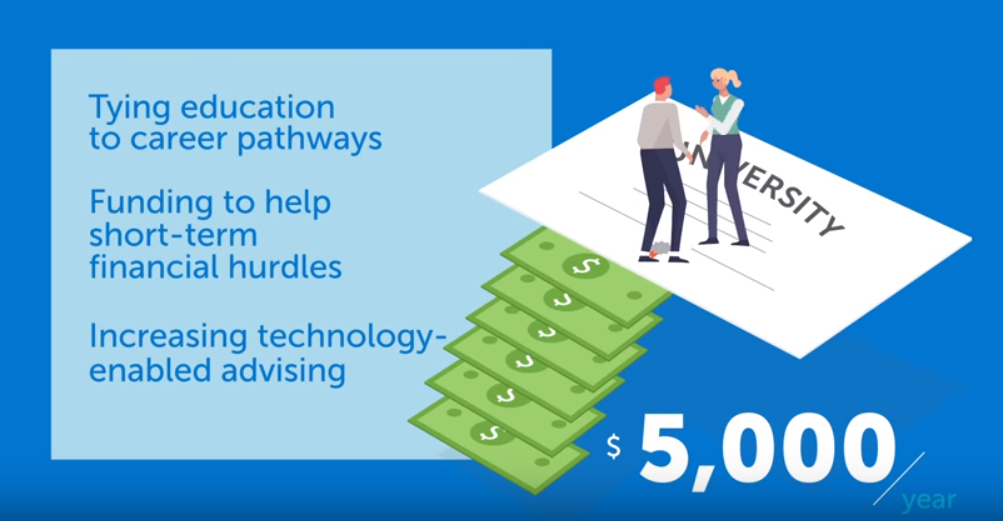 The Georgetown Center on Education and the Workforce (CEW) recently
The Georgetown Center on Education and the Workforce (CEW) recently